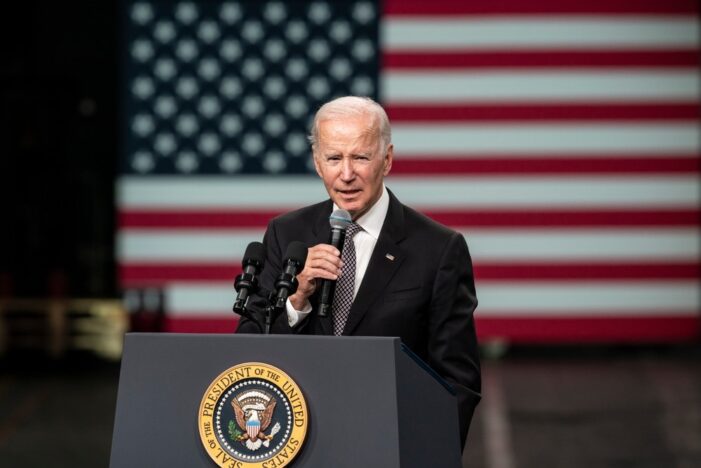Poughkeepsie, NY – October 6, 2022: President Joe Biden Jr. delivers remarks at IBM facility. (Shutterstock)
By Linda Nwoke, CAW Exclusive
October 6 will remain indelible in the minds of many Americans. A day that President Biden issued a presidential declaration pardoning the federal convictions of offenses from the possession and conviction of marijuana, cannabis, or as popularly known ‘weed.’ The proclamation was the delivery of long overdue promises made by the President during his campaign in 2019.
It is noteworthy that the statement applies mainly to federal convictions, including convictions in D.C., but not those convictions determined under other state or local laws.
Hence, Americans who were convicted of the possession of marijuana under federal laws will no longer be classified as criminals. A development appraised as a big win, especially for many people of color who have been disproportionately affected by the law more than others.
Furthermore, the President encouraged the states to consider adopting the law since many marijuana cases are predominantly state-based offenses and ‘possession’ cases.
In his speech, he acknowledged that people’s lives could become upturned when convicted because of their possession or usage of marijuana. However, it is reported that there is no one in federal prison on a single charge of possession of marijuana. However, the pardon will help many convicts overcome obstacles to finding a job, renting a home, and getting their lives together.
President Biden explained that many people with prior Federal convictions for marijuana possession might be denied housing, employment, or educational opportunities. As a result, “My action will help relieve the collateral consequences arising from these convictions,” he said
Advocacy groups like the Drug Policy Alliance, whose leader, Kassandra Frederique, expressed excitement at the announcement, said it is long overdue. Frederique agrees with the President that people should not be saddled with a criminal record that prevents them from accessing important life opportunities. Especially for an act that has become legal in almost twenty states (19 states and D.C.) and is no longer a criminal offense in over 30 states.
These states have legalized the medical use of cannabis to different levels. Each structure has its criteria for determining the conditions for prescribing cannabis, amounts, and the process for issuing medical marijuana licenses.
Another prominent figure, Reverend Al Sharpton, leader of the National Action Network, said the action would give many Americans their lives back. However, he quickly mentioned, “The United States will never justly legalize marijuana until it reckons with outdated policies. The ones that equated many young Black men with hardened drug pushers.”
The But
However, despite the good news, the proclamation has apparent limitations. For instance, the pardon is limited to marijuana, leaving out possession and charges relating to the production or intent to distribute.
Most noteworthy is that the order leaves out noncitizens, predominantly undocumented immigrants, in possession at the time of their arrest, which often affects Black and Latino people.
In a statement, the Senior Policy attorney for an advocacy group called The Immigrant Defense Project, Ms. Jane Shim, applauded Mr. President’s pardon. However, she quickly pointed out their disappointment towards the Administration’s somewhat deliberate exclusion of undocumented immigrants, who constitute a substantial number of the offenders.
According to her, “It is extremely disappointing that the Administration excluded undocumented immigrants. Furthermore, some pardoned immigrants may remain at risk of detention and deportation because of a marijuana offense due to punitive immigration laws.”
Shim encouraged President Biden to ensure that marijuana possession convictions should not threaten an individual’s immigration status. Noting that Federal immigration authorities have in the past, and presently, deny citizenship and green card applications based on convictions from possession of marijuana possession.”
She explained that Immigration and Customs Enforcement had deported many people for marijuana possession. Beyond the perceived opportunities created by the pardon, many families who are often at risk of being separated due to deportation must be protected from marijuana usage and possession convictions.
She aligns with Rev. Al Sharpton’s view that immigration laws need to change to ensure that activities related to marijuana do not result in detention and deportation. Therefore, the federal government’s move seems in line with similar actions in places like New York City. Such cities have already made progress toward decriminalizing low-level marijuana arrests, but factions remain in this movement.
Effect of Federal Law On Immigration
Without an effective change in the law, there remains a substantial immigration risk involved in using, growing, possessing, or selling marijuana or even visiting marijuana dispensaries. The violation and conviction of any of the laws relating to controlled substances, including marijuana, can be considered a basis for denying visa applications, entering into the U.S, revoking a visa stamp, denying applications for naturalization or permanent residency, subjection to mandatory detention, and in some cases, even deportation.
Marijuana as a Basis for Deportation
As the law stands for noncitizens, you can be deported for a marijuana-related conviction on controlled substance grounds. Those seeking to become American citizens can become disqualified and barred if they cannot establish good moral character.
Deductively
For now, cannabis or marijuana possession remains a deportable offense for noncitizens.
An immigration officer can deny an immigrant re-entry if they have used, possessed, or sold marijuana, even in states where it is legal. Their citizenship application can also be rejected, or they can be deported.
Green card holders can lose their lawful permanent resident status and deport for a cannabis-related conviction. Deportation of over 44,000 people nationwide took place between 2003 to 2018 for possession of marijuana; thus, many undocumented and noncitizens in the U.S remains at risk.
Although there is hope that President Biden’s announcement serves as the first step toward decriminalization of the drug, however, until the call becomes law, immigrants should endeavor to:
- Talk to a lawyer first if they require cannabis for medicinal reasons.
- Please stay away from cannabis/ marijuana until they become a U.S. citizen.
- Avoid carrying marijuana or keeping a medical card at any point in time.
- Seek a lawyer if marijuana was used or if they worked in the industry before applying for immigration status or citizenship adjustment.
Deportation Defense
Brian Figeroux, Esq., of the Law Firm of Figeroux & Associates, who has been practicing immigration law for over 25 years, explained, “In a state like New York, the offense remains a deportable offense even if the state joins others in the complete legalization of marijuana. The best defense against deportation is to become a U.S. citizen.”
Experts argue that someone convicted of cannabis under New York law shouldn’t form a basis for the deportation of any of the over 4.5 million immigrants whose home is in New York. Yet, racial profiling is possible emanating from cannabis legalization for recreational usage. For instance, law enforcement officers can stop immigrants based on racial profiling, ask questions, or conduct a background check on their legal status.
Such police officers violate people’s Constitutional rights and pridefully enforce white nationality. They will stop and question anyone that looks like an immigrant and prosecute them if they have more than 30 grams of weed.
These arrests will cause immigration authorities to place these immigrants in removal proceedings. Thus, decriminalization does not stop non-criminal deportation.


